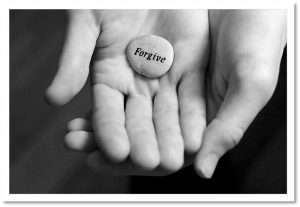 Anger and hurt are things we all experience when we feel that someone has treated us unfairly. There are consequences to those feeling, though. It has become common knowledge that when we hang on to the pain (refuse to forgive), we are only hurting ourselves. Someone put it this way, “Unforgiveness is like drinking poison and expecting someone else to get sick.”
Anger and hurt are things we all experience when we feel that someone has treated us unfairly. There are consequences to those feeling, though. It has become common knowledge that when we hang on to the pain (refuse to forgive), we are only hurting ourselves. Someone put it this way, “Unforgiveness is like drinking poison and expecting someone else to get sick.”
Even the secular world has discovered that a lot of benefits flow from forgiving. Notice this advice I found on the Mayo Clinic website:
Letting go of grudges and bitterness can make way for improved health and peace of mind. Forgiveness can lead to:
- Healthier relationships
- Improved mental health
- Less anxiety, stress and hostility
- Lower blood pressure
- Fewer symptoms of depression
- A stronger immune system
- Improved heart health
Perhaps you realize that forgiving others would be good for you. Most of us know that we SHOULD forgive others, the problem is HOW. It’s one of those “easier said than done” things.
Let me share a true story about a person who was asked to extend forgiveness in a very difficult situation.
A Christian woman visited a condemned Nazi officer after WWII. That officer had caused the brutal deaths of both of her parents and her siblings. He had even inflicted torture on her. The officer requested the meeting because he wanted to ask for her forgiveness. When she entered the room where he was being held, he began weeping and begging her to forgive him. What would you have done? Her first reaction was an almost overwhelming feeling of anger and rage. She couldn’t help but think that his feeble tears wouldn’t bring her family back. She couldn’t help but wonder why he should ever be forgiven since his crimes were so wicked?
Here is the amazing part of that story. She DID go on to extend a sincere expression of forgiveness toward that Nazi war criminal. How was that possible? What allowed her to have that genuine, forgiving attitude?
The key to that woman’s forgiveness was not that she was a really, really, good person. I’m sure she would be the first one to tell you that wasn’t the reason. Her ability to forgive stemmed, not from her own goodness, but from the forgiveness she had already received.
Because that woman was a Christian, her experience with Jesus Christ made all the difference. Christians are told to forgive others in the same manner that they have been forgiven: “… just as the Lord forgave you, so also should you” (Colossians 3:13).
How does God forgive? Jesus told a story to illustrate this truth. You can read the whole story in Matthew 18:21-35. Here is my paraphrase.
One day a business owner was checking his company’s records and found that one employee had cheated him out of millions of dollars. When the owner confronted the employee with the proof, he admitted his guilt and begged for mercy. The owner felt sorry for him and graciously forgave the entire debt.
Then the forgiven employee went out and found a fellow employee who owed him about a hundred dollars. He demanded his money back, but his fellow employee was completely broke and begged for mercy. Instead of forgiving this fellow employee like he himself had been forgiven, he had him arrested and thrown in jail.
Later the business owner found out what his ungrateful employee had done, and had him arrested. Then Jesus gave this application: “My heavenly Father will also do the same to you, if each of you does not forgive his brother from your heart” (Matthew 18:35).
How can we be motivated to forgive others? We must first see ourselves as great sinners who have been graciously forgiven. Don’t miss this: our sin is great, not because of WHAT we have done, but because WHO we have done it against.
The late Dr. R.C. Sproul said, “When we understand the character of God, when we grasp something of His holiness, then we begin to understand the radical character of our sin and hopelessness. Helpless sinners can survive only by grace.”
When someone sins against us, they are only offending another flawed sinful being. We forget quickly that all our sins are committed against a Holy God! When King David was confronted about his need to be forgiven for some awful sins, he told the Lord “Against You, You only, I have sinned and done what is evil in Your sight, so that You are justified when You speak and blameless when You judge” (Psalm 51:4).
Have you trusted in Christ’s work to pay off your sin debt? It’s time to stop excusing your sin and put your faith in Christ’s offer of undeserved forgiveness. “For by grace you have been saved through faith; and that not of yourselves, it is the gift of God; not as a result of works, so that no one may boast” (Ephesians 2:8–9). The humbling knowledge of God’s great forgiveness makes it easier for us to pass forgiveness onto others.

Leave A Comment